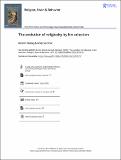The evolution of religiosity by kin selection
Abstract
Despite religion’s apparent ubiquity, hypotheses about the selection pressures that may have shaped its cognitive foundations remain controversial. Here, we develop and analyse a mathematical model inspired by Crespi and Summers’ suggestion that parent-offspring conflict has driven the evolution of religious beliefs to explore the causes and consequences of these selection pressures. To this end, we employ kin selection methodology to investigate how selection may mould an individual’s propensity for religiosity and corresponding patterns of gene expression, revealing that the evolution of religiosity is modulated by genetic relatedness between social partners, that selection in relation to religiosity may depend on an individual’s age and sex, and that religiosity can foment intragenomic conflicts of interest that give rise to parent-of-origin specific patterns of gene expression and concomitant clinical disorders. More generally, we develop a formal, theoretical framework that enables the derivation of clear-cut, comparative predictions about adaptive as well as maladaptive phenotypes.
Citation
Stucky , K & Gardner , A 2022 , ' The evolution of religiosity by kin selection ' , Religion, Brain & Behavior , vol. Latest Articles . https://doi.org/10.1080/2153599X.2022.2076727
Publication
Religion, Brain & Behavior
Status
Peer reviewed
ISSN
2153-5981Type
Journal article
Description
Funding: Funding. This research was supported by a Natural Environment Research Council Independent Research Fellowship (grant no. NE/K009524/1) and a European Research Council Consolidator (grant no. 771387).Collections
Items in the St Andrews Research Repository are protected by copyright, with all rights reserved, unless otherwise indicated.

